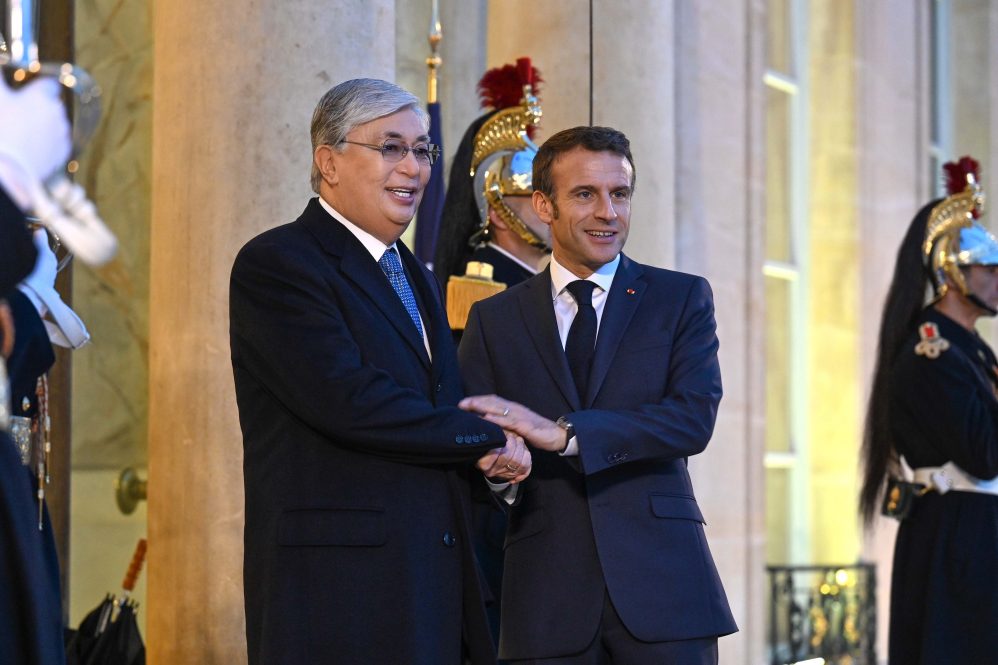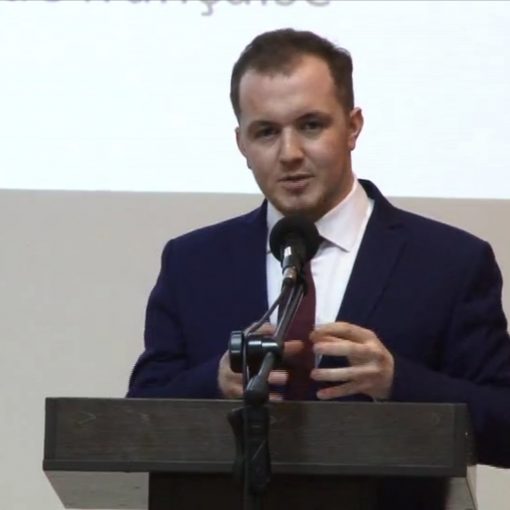The meeting between the President of the Republic of Kazakhstan, Kassym-Jomart Tokayev and his French counterpart Emmanuel Macron, which took place on Tuesday November 29, 2022 at the invitation of the latter, relaunches the Franco-Kazakh partnership and places the multilateral diplomacy of the main power of Central Asia on the front of the stage.
Kazakhstan is a country located at the crossroads between Europe and Asia and is surrounded by two giants: Russia to the north and China to the east. Since the proclamation of its independence on December 16, 1992, the country has had to establish a foreign policy adapted to its geographical reality, as a country landlocked between two world powers, but very rich in natural resources (crude oil, gas, coal and uranium in particular) in order to ensure a place of choice in the post-Soviet world.
The multilateral policy set up by Kazakhstan is explained by all these factors in order to open up internationally and become a key player in the region.
The priority for the country is to maintain stable relations with its neighbours. Kazakhstan is a member of several organizations in which its direct neighbors also sit: the Collective Security Treaty Organization (CSTO), a politico-military organization whose purpose is the strengthening of international and regional peace, the Shanghai Cooperation Organization (SCO), an intergovernmental organization of political and economic nature, as well as the Eurasian Economic Union (EAEU) whose objective is to promote closer integration of its member countries, already linked since 2010 within a customs union. Kazakhstan is also part of the Commonwealth of Independent States (CIS), alongside nine other former Soviet republics.
In order to face the economic challenges inherent to the fall of the USSR, Kazakhstan turned to Western countries, and involved foreign investors in order to set up different types of cooperation. The oil sector developed during this period, and various Western companies, like the french company Total in 1992, settled in the country, allowing the country to benefit from an income from its natural resources.
At the beginning of that same year, the country established its first diplomatic relations with the French Republic, before Presidents François Mitterrand and Nursultan Nazarbayev signed the first bilateral relationship agreements in September 1993. Several presidential and ministerial visits have taken place then, and the two countries are celebrating the thirtieth anniversary of their relationship this year.
Kassym-Jomart Tokayev’s visit to Emmanuel Macron comes in a particular context; the day after his visit to Vladimir Putin in Moscow, and just over a week after the early presidential elections in Kazakhstan, in the midst of a period of constitutional reforms; against the background of the war in Ukraine and major geopolitical tensions.
The two heads of state also discussed their joint desire to “contribute to peace, security and stability at the global and regional levels. They underlined their unwavering attachment to international law and to the fundamental principles of the United Nations Charter, in particular to the respect for the sovereignty and territorial integrity of States”, as reported in the joint press release between France and Kazakhstan, available on the Elysée website. The same press release reports the concern of both parties regarding the situation in Ukraine. It is in this respect that the visit of the Kazakh President to Paris reveals a potential issue in the negotiations between the Ukrainian and Russian parties; Kazakhstan, which has maintained close ties with Russia since the fall of the Soviet Union, particularly at the security level (remember that the two states are founders of the CSTO), has not taken up the cause of the latter, not recognizing the annexation of Donetsk, Lugansk, Zaporizhzhia and Kherson, based on its attachment to the United Nations Charter and respect for international law. Russia nevertheless remains a major strategic partner for Astana, but its policy of multilateral dialogue, both with Western and Asian powers, implies that Kazakhstan could have a role to play in possible negotiations with the Kremlin about the conflict between Russia and Ukraine (like his role as mediator in the Russian-Turkish crisis of 2015), French President Emmanuel Macron having always advocated dialogue with the two parties in this conflict in the search for a possible resolution of the war.
President Tokayev’s visit to France is part of a more global framework for strengthening exchanges between China and Europe, through the New Silk Roads (BRI – Belt and Road Initiative), which the conflict in Ukraine has indirectly favored by enabling Kazakhstan to strengthen its role as a major logistics platform through its position at the crossroads between Asia and Europe. In this regard, it seems necessary to recall that Kazakhstan is the only country in the region to have signed an Enhanced Partnership and Cooperation Agreement (EPCA) with the EU, which entered into force in 2020, and is therefore a key partner for European countries, particularly in the context of its trade with Asia; the country also hosted the first European Union-Central Asia Summit in Astana on October 27, 2022, marking the strengthening of the EU with its first partner in the Central Asia region.
Kazakhstan is a major partner of France (second crude oil supplier -behind the United States- as well as uranium), and the two countries have been linked by a strategic partnership since 2008; France is one of the main investors in Kazakhstan, and several major French groups operating in different fields are based there, such as TotalEnergies or Orano in the energy sector, Decathlon or Leroy Merlin for distribution, cement manufacturer Vicat and others.
The visit of Kassym-Jomart Tokayev at the invitation of Emmanuel Macron thus resulted in the signing of several major agreements for cooperation between the two countries, particularly in the field of renewable energies, the production of green hydrogen, nuclear civil, water resource management, rail transport and agribusiness. TotalEnergies has thus initiated the implementation of its energy transition by signing an agreement with its Kazakh partners Samruk-Kazyna and KazMunayGas for the development of the Mirny project, the largest wind project ever initiated in Kazakhstan. Other agreements have been signed, in areas of mutual interest as reported in the joint press release, in the areas of economy and investment, education (like the Sorbonne- Kazakhstan Institute inaugurated by François Hollande and Nursultan Nazarbayev in 2014, Bolachak and Abay-Verne scholarships), health, science and culture. Discussions on the nuclear power plant project have also reportedly taken place, with Astana wishing to have such a facility. France, in balance with China and South Korea in the establishment of this plant, could effectively provide its expertise in the matter, which would give new impetus to Franco-Kazakh cooperation.
This Franco-Kazakhstani bilateral meeting in Paris, sheds light on Kazakhstan, at a time when the country is embarking on a major reform; on June 5, a constitutional referendum was organized by President Tokayev in order to open the way to a “New Kazakhstan”. A reform leading to a limitation of presidential mandates to a single and non-renewable seven-year term, to social measures to support young people, to reform pensions and the field of health, as well as to economic liberalization in order to promote entrepreneurship and foreign investment. A very encouraging momentum of reforms in this country – whose former head of state Nursultan Nazarbayev, who remained in power for 29 years, was stripped of his functions after violent demonstrations in January 2022 – which has been setting up, since its independence, a policy aimed at making it one of the 30 most developed world economies by 2050.







